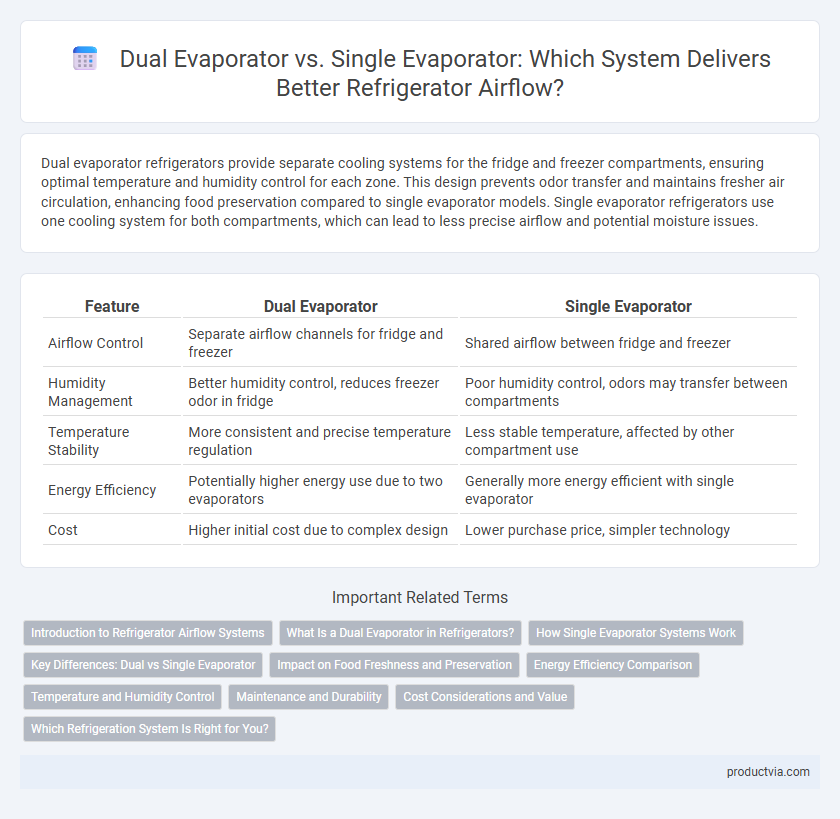Dual evaporator refrigerators provide separate cooling systems for the fridge and freezer compartments, ensuring optimal temperature and humidity control for each zone. This design prevents odor transfer and maintains fresher air circulation, enhancing food preservation compared to single evaporator models. Single evaporator refrigerators use one cooling system for both compartments, which can lead to less precise airflow and potential moisture issues.
Table of Comparison
| Feature | Dual Evaporator | Single Evaporator |
|---|---|---|
| Airflow Control | Separate airflow channels for fridge and freezer | Shared airflow between fridge and freezer |
| Humidity Management | Better humidity control, reduces freezer odor in fridge | Poor humidity control, odors may transfer between compartments |
| Temperature Stability | More consistent and precise temperature regulation | Less stable temperature, affected by other compartment use |
| Energy Efficiency | Potentially higher energy use due to two evaporators | Generally more energy efficient with single evaporator |
| Cost | Higher initial cost due to complex design | Lower purchase price, simpler technology |
Introduction to Refrigerator Airflow Systems
Refrigerator airflow systems are essential in maintaining consistent temperature and humidity levels to preserve food freshness. Dual evaporator systems use separate evaporators for the fridge and freezer compartments, providing independent cooling and preventing odor transfer between sections. Single evaporator systems rely on one evaporator to cool both compartments, which can lead to temperature fluctuations and mixed air circulation.
What Is a Dual Evaporator in Refrigerators?
A dual evaporator in refrigerators features two separate cooling systems that independently regulate the temperature and humidity levels in the fridge and freezer compartments, enhancing food preservation by reducing odor transfer and maintaining optimal freshness. This technology ensures precise airflow control, preventing moisture buildup and frost formation, which is a common issue in single evaporator models that share one cooling system for both compartments. By maintaining distinct environments, dual evaporator refrigerators improve energy efficiency and extend the shelf life of perishable items compared to single evaporator units.
How Single Evaporator Systems Work
Single evaporator systems circulate cold air from a single cooling coil, distributing chilled air throughout the main refrigerator and freezer compartments via fans and vents. This design can lead to less precise temperature control and increased humidity, as air flows between compartments causing potential odor transfer. Despite simpler construction and lower manufacturing costs, single evaporators often struggle to maintain optimal freshness, especially in dual-zone refrigerators.
Key Differences: Dual vs Single Evaporator
Dual evaporator refrigerators use two separate cooling systems, allowing independent temperature control in the fridge and freezer compartments, which improves airflow distribution and prevents odor transfer. Single evaporator systems rely on one cooling unit for both compartments, often resulting in less precise temperature control and potential air mixing between sections. The dual setup enhances humidity management and energy efficiency by tailoring airflow, whereas single evaporators may cause uneven cooling and increased energy consumption.
Impact on Food Freshness and Preservation
Dual evaporator refrigerators maintain separate cooling zones for the fridge and freezer, significantly reducing humidity cross-contamination and preserving optimal freshness. Single evaporator systems share one cooling mechanism, which can cause moisture transfer and odors, potentially accelerating food spoilage. Enhanced airflow management in dual evaporators promotes better temperature control, extending the shelf life of perishable items.
Energy Efficiency Comparison
Dual evaporator refrigerators provide superior energy efficiency by maintaining separate cooling zones for the fridge and freezer compartments, which reduces temperature fluctuations and minimizes compressor workload. Single evaporator models use one cooling system for both compartments, often resulting in higher energy consumption due to shared airflow and less precise temperature control. Studies show dual evaporator systems can reduce energy usage by up to 20% compared to single evaporator counterparts, improving overall appliance efficiency.
Temperature and Humidity Control
Dual evaporator refrigerators provide superior temperature and humidity control by using separate cooling systems for the fridge and freezer compartments, preventing moisture transfer and maintaining optimal freshness. Single evaporator models share one cooling system, which often leads to temperature fluctuations and higher humidity levels, causing faster food spoilage. This distinct airflow control in dual evaporators enhances preservation of diverse food types by preventing odor mixing and condensation buildup.
Maintenance and Durability
Dual evaporator refrigerators enhance airflow by independently managing the fresh food and freezer compartments, reducing moisture transfer and preventing odor mixing, which decreases the frequency of maintenance related to mold and odor buildup. The separate evaporators maintain more consistent temperatures, improving compressor efficiency and extending overall system durability compared to single evaporator models. Single evaporator refrigerators often require more frequent defrosting and filter replacements due to combined airflow, which can accelerate wear and increase maintenance costs over time.
Cost Considerations and Value
Dual evaporator refrigerators typically have higher upfront costs due to the complexity of their design and additional components, but they offer improved temperature control and reduced odor transfer between compartments. Single evaporator models are more affordable and simpler to maintain, making them a cost-effective choice for budget-conscious consumers. Evaluating long-term energy efficiency and food preservation benefits is crucial for determining the overall value of each system.
Which Refrigeration System Is Right for You?
Dual evaporator refrigerators offer separate cooling chambers for the fridge and freezer, enhancing temperature control and reducing odor transfer, while single evaporator systems use one cooling unit for both compartments, potentially leading to less precise airflow management. Choosing between dual and single evaporator refrigeration systems depends on your priorities for energy efficiency, food preservation, and budget; dual evaporators typically provide better humidity and temperature control but at a higher cost. For households requiring optimal freshness and reduced cross-contamination of odors, dual evaporator models are ideal, whereas single evaporator units suit those seeking a more affordable, reliable refrigeration solution.
Dual Evaporator vs Single Evaporator for Refrigerator Airflow Infographic

 productvia.com
productvia.com